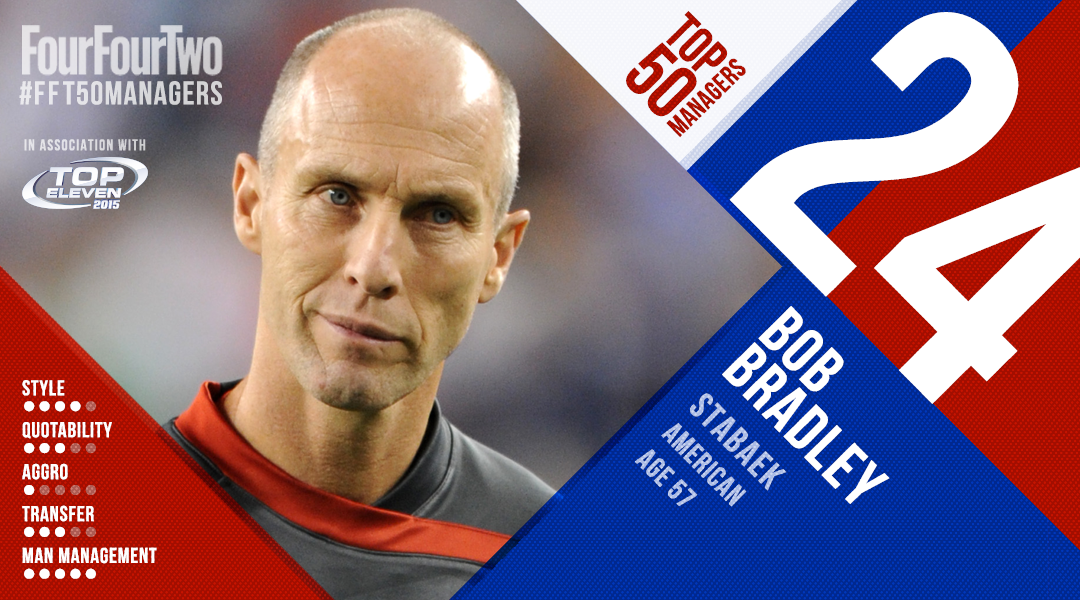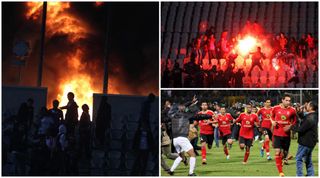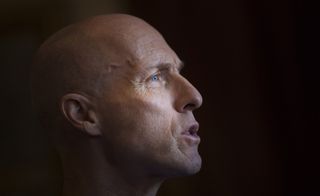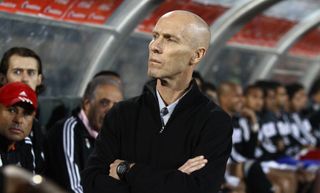Why Bob Bradley is heading for the top – one fascinating step at a time
Kristan Heneage talks to the American envoy who listens, learns and adapts...

When Bob Bradley arrived in Egypt to coach the national team, he didn’t speak Arabic. However, he quickly learned the meaning of ‘كأس العالم’ (Kasila Alam): ‘World Cup’.
The country was desperate to qualify for the global get-together. That yearning stemmed from a bizarre duality in which the country dominated the Africa Cup of Nations – when Bradley arrived in 2011, they had won the last three editions – but only qualified for the World Cup twice, once before World War Two. It concocted a high-pressure situation, but one that Bradley seemed to enjoy. He often mingled with locals, taking walks with his wife through the Cairo markets.
I was taught by my father to stand up for what is right and what you believe in
By then he was in his fifties, with three decades of coaching behind him: he had started in 1981 with the Ohio Bobcats aged just 22, in part because the opportunities to play professionally “just weren’t there”. Yet even all that experience couldn’t prepare him for what would unfold with the Pharaohs.
Not for the first time in Egypt, politics and football blended together in February 2012 with the Port Said Stadium riot, in which at least 72 people died. Bradley, watching Zamalek versus Ismaily in Cairo with his coaching staff, was made aware of the situation – as well as the fact the game in front of him would not continue.

“It’s pretty clear this was not a case of fan violence,” Bradley told ESPN in the wake of the riot. He was right, and more impressively he was willing to say so publicly as the national team’s head coach. “That’s how I was taught by my father, to stand up for what is right and what you believe in,” Bradley tells FourFourTwo.
Amid mounting tension, during which the domestic league was suspended, Bradley became a voice of reason and someone willing to listen before he spoke. As goalkeeper coach Zaki Abdel-Fattah put it, “He was more important than the US Embassy.”
Learn to listen, listen to learn
Get FourFourTwo Newsletter
The best features, fun and footballing quizzes, straight to your inbox every week.
“One of the things I said in Egypt and here [at current club Stabæk] – maybe on the first day – was ‘I don’t come here with all the answers’,” Bradley explains. “‘I come here to observe and listen. Don’t get me wrong, I have my own ideas, but I also need to get to know you.’”
That willingness to understand is why so many players stay in touch. Players like Enoch Kofi Adu, a Ghanian midfielder who joined Stabæk last year on a six-month loan from Club Brugge. His form in Norway earned him a move to the Champions League with Malmö FF. “His career just needed a reboot,” Bradley laughs, adding that a week doesn't go by without him hearing from the midfielder.

At Stabæk, where Bradley has been since January 2014, the loss of key players has been an unfortunate consequence of Bradley’s success and the club’s poor financial situation. Tipped to struggle in the Tippeligaen, they are currently second behind traditional powerhouse Rosenborg. That form has seen the likes of Morten Thorsby and Franck Boli join Adu in being prised away by foreign suitors.
That has meant evolution for Bradley, previously used to the relatively closed systems of international and MLS management. But some things remain the same: asked how he copes with losing prized assets, he simply says “I still try to figure out, with the group of players we have, how to take advantages of their strengths.”
Adapt and thrive
It looks a mess, but Bradley is in complete control
His adaptability is impressive. With Egypt, the suspension of the domestic league meant his players were losing match sharpness. Civil war and revolution might seem a reasonable excuse but with World Cup qualifiers looming, Bradley organised training camps and matches in a variety of locations.
“We had to go anywhere we could to get games,” he explains. “We played in Dubai, we played some games in Abu Dhabi, Sudan, we were going anywhere for matches. But during that whole period we were together a lot.”
Breeding a togetherness amongst the squad has been a foundation of Bradley’s success throughout his career: the team beats the individual. However to describe him simply as a motivator is reductionist.

“Bob is the kind of guy who is very detail-orientated,” says Jesse Marsch, who won the 1998 MLS Cup with Bradley’s Chicago Fire team and is now head coach of the New York Red Bulls. “He works very hard and tries to look at things from a lot of different angles.”
That helps him see things others might not. Speaking after watching a week’s worth of his training sessions with Stabaek, one Norwegian broadcaster said: “It looks a mess, but Bradley is in complete control.”
Attempting to explain the ‘mess’, Bradley says: “There’s a package of things that need working on every day. If you see Pep Guardiola and Jose Mourinho, these are coaches who are on the field with little details in positioning and where the ball goes.”
Watch and learn
I’d love to go to any club that has a way of doing things – that history. Where could that be? It could be in a lot of places
To witness Bradley at work is to see some of the same traits that Mourinho and Guardiola possess. Equally, the way he carries himself, his tone, it demands respect but in a calm way. Whether it is with his the Gold Cup-winning US team or Stabaek, he is keen to impart his ideas. Those have been honed by what he calls his “10,000 hours”.
Bradley closely studied teams like Barcelona and Juventus training, and it left a lasting impression. Early in his career, the comparisons were obvious: his Princeton University side closely resembled the Milan side of the early ‘90s, with Marsch operating in the role of Demetrio Albertini, another in the role of Franco Baresi and so on.
His education continues: he is currently undertaking his UEFA Pro Licence, a necessary next step on the path to Europe’s upper echelons (it is a mandatory qualification for most top divisions). Bradley’s time at Stabæk has brought consistent speculation over jobs in Sweden, Denmark and England.

Asked if he is ready to make the next step up, he is typically thoughtful, seeing both sides. “I always have the confidence in my ability, but the question is if a team in the Bundesliga needs a coach, have I proved myself to them?”
He will also not accept the first offer that arrives. Passion for the game is something Bradley talks about throughout our conversation. It’s why he chose the small club of Stabæk in Norway when friends and advisors questioned it. Pristine facilities and flashing lights are no enticement, rather the chance to embed into a culture and grow himself, even at 57.
“When I went to Athletic Bilbao recently it was because they sponsor a film festival,” he says. “A club like Athletic Bilbao that has so much passion in the club and what their youth system and first team is all about, I’d love to go to any club that has that way of doing things – that history. Where could that be? It could be in a lot of places.”
#FFT50MANAGERS See our full list of the top 50 managers and features on them here

‘I was planning to fly to Blackburn to see how the club looked, but couldn’t because of the volcano. Dortmund were in pole position to sign me, though’: Robert Lewandowski reveals why Premier League move fell through in 2010
Virgil van Dijk feels the manner of Liverpool's defeat to Tottenham Hotspur in the Carabao Cup was 'unnecessary'